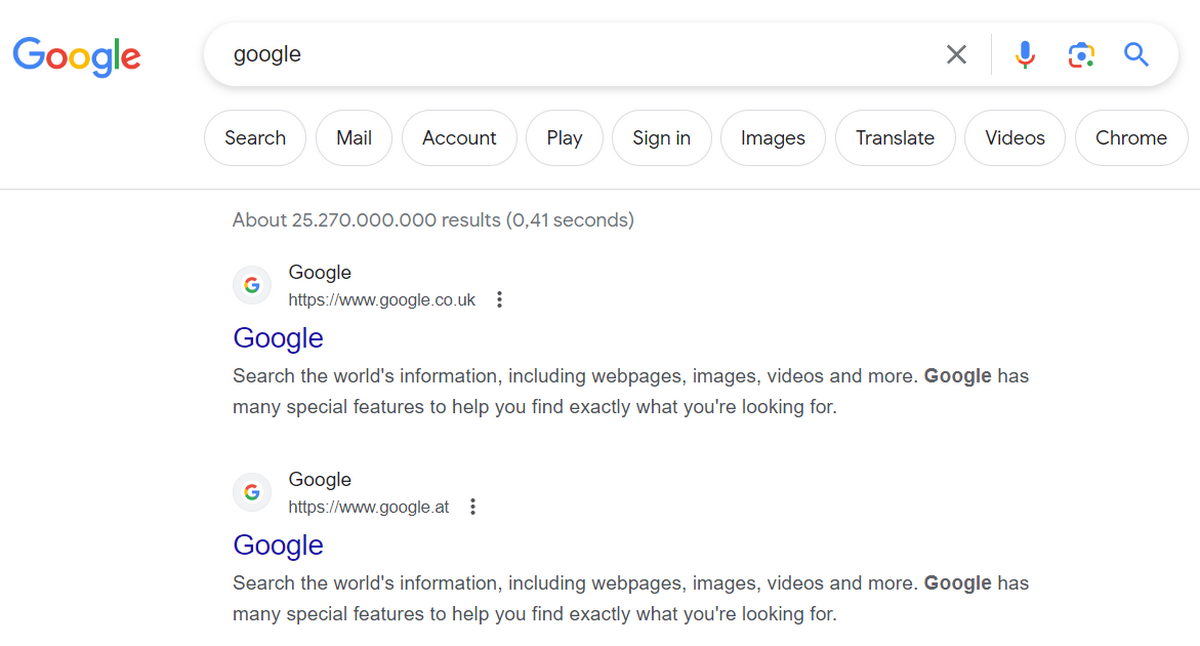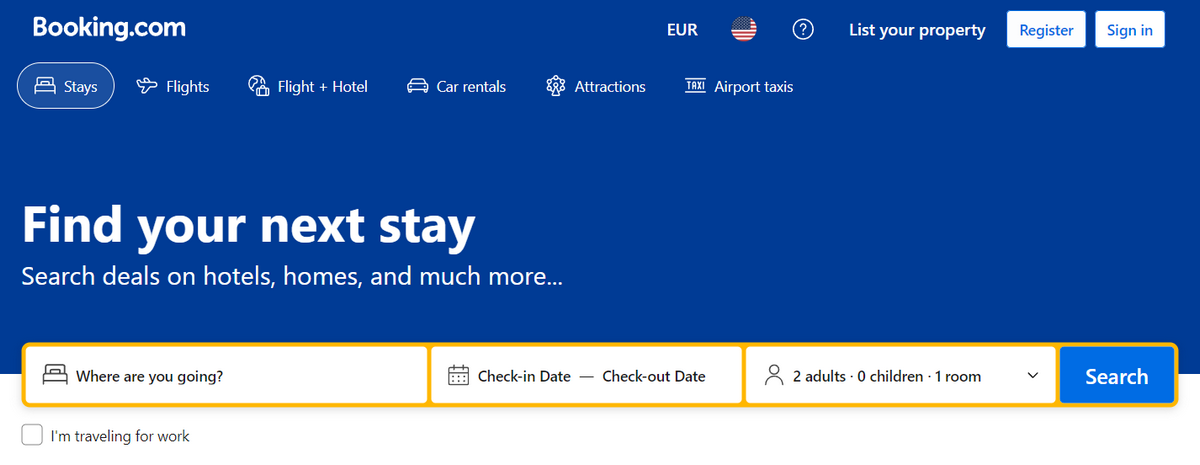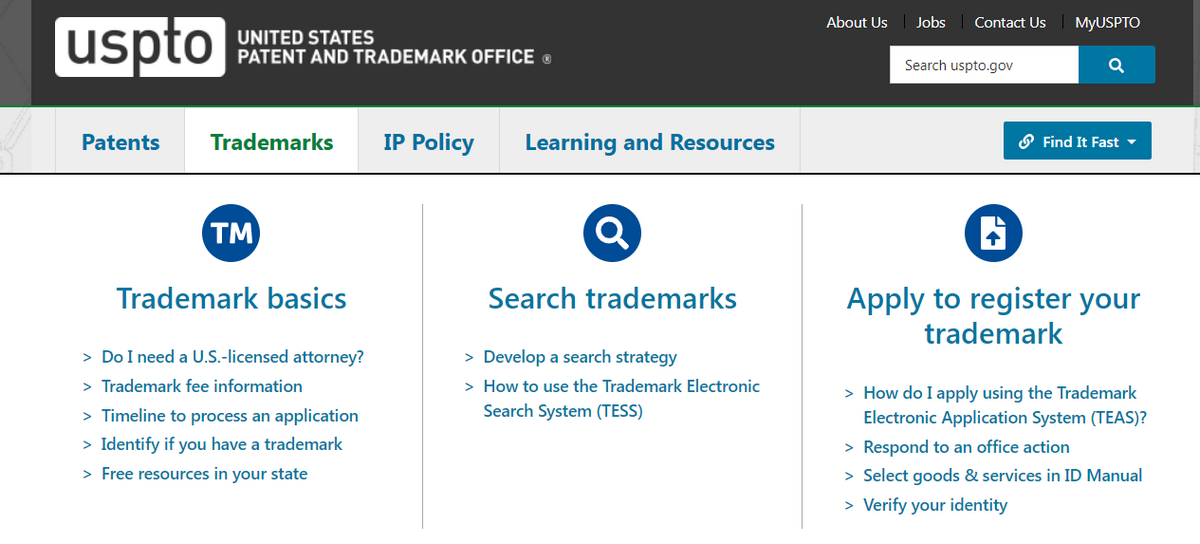Introduction
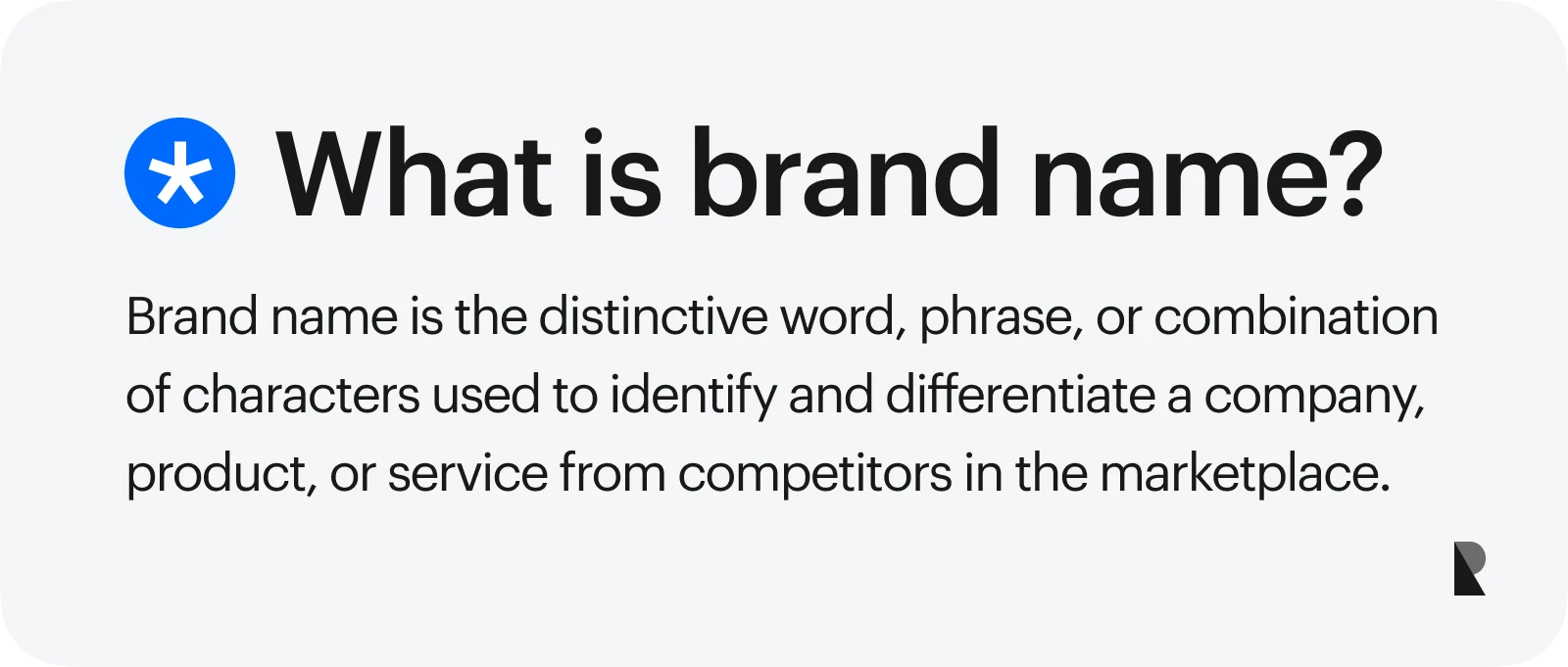
Do you know that producing brand awareness takes 5 to 7 impressions? According to studies, customers will not remember a brand after the first rendezvous or find a special place in their hearts after the second and third encounters. Only after five consistent meetings will they start recalling your company by name.
Along with the logotype (the most recognizable visual identity element), brand name plays a crucial role in a company's success. It helps stand out from the crowd and provides a positive mental anchor for the target audience to remember the company at the right time and place.
There is more. The significance lies in its ability to perform several crucial tasks that affect the company, such as
- Affect the public perception of the company on the market.
- Set the right expectations for newcomers.
- Build trust among clients.
- Create lifelong customer loyalty and advocacy.
Going deeper into its role and capabilities, you will see that it is a cornerstone of the company's existence in an oversaturated market. It is a strategically thought-out marketing tool to achieve short- and long-term goals.
Goliaths of industry like Google or Instagram prove that, in practice, they generate billions of dollars with their unforgettable business names.
If you are ready to level up your game with the best name, you have come to the right place because we will cover all the fundamentals you need, including different ones and must-have characteristics.
We will also guide you through creating one for your company, avoiding all common mistakes.
What Makes a Brand Name Good?
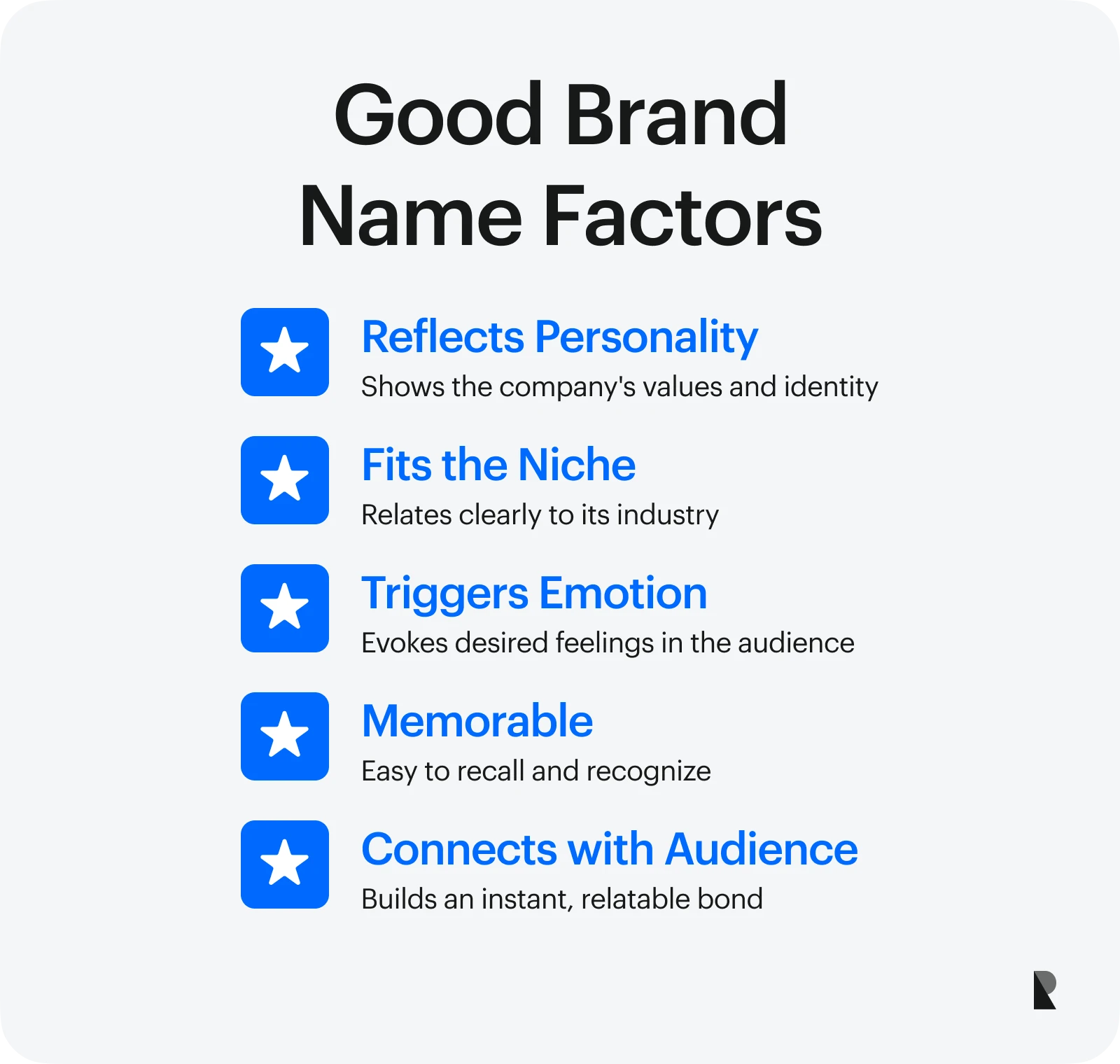
Starting with a clear understanding of what makes a good naming is a great way to make informed decisions when choosing the right option. So, how can you describe a good business name?
Reflects the company's personality
First and foremost, a good brand name ingeniously reflects the company's personality. It may use different tools to do that.
For instance, it may feature the founder, hint about values or mission, play with words, and even use popular jargon. However, whatever the choice is, it represents the philosophy of the company and everything it stands for.
Perfectly blends into the niche
A good brand name perfectly blends into the niche. How often have you first recalled the company's name instead of the niche's official title? This is the power of a well-thought-out business name.
Take a Google that has become synonymous with the niche. There is even a phrase, "Google it." Their branding team has done an excellent job by picking this name. It is derived from "googol," an unfathomable number.
This concept profoundly conveys the meaning of the immense web and the unlimited ways of searching and locating information. Seek this quality in your naming options as well.
Highlights emotions
A good naming highlights emotions the company wants to trigger in the audience when interacting. Emotional connection plays a huge role in establishing strong, healthy, and loyal relationships that go a long way in the ever-changing market.
In the cold, humanless digital environment, this emotional constituent of the business name gets more meaning and significance. People crave warm interactions; therefore, they quickly fall for companies that evoke positive feelings with just one mention.
Memorable
A good brand name is always memorable. It can be short and sharp or, on the contrary, unnecessarily long. It may have good alliteration or foreign roots.
Whatever the case, it quickly finds its place in people's minds and cements its position immediately.
Even though it may take 5 to 7 times to remember, the memorable name will always surface from the customer's memory.
Connects with the audience
A good brand name connects with the audience on different levels. Some immediately relate to the customers: something in the form of a bond.
At the same time, others collaborate with marketing and advertising campaigns so organically that they naturally appeal to potential customers and prospects.
Obligatory Characteristics of Good Brand Name
So, a good business name is memorable, emotional, and relatable to the audience. It also reflects the company's personality and blends into the niche. Consider the other three crucial attributes.
Enduring
Developing a strong identity takes years, even decades. Therefore, a brand name should last as your business grows and evolves. It should adapt to trends, market preferences, needs, and expectations.
It should also be flexible enough to accommodate new strategies and stay relevant when your focus changes.
Simple
This trait is debatable since tricky and fancy business names quickly get stuck in people's minds. However, as practice shows, the simpler the word is, the more successful it can be.
Not only is that because it is easier to remember but also easy to pronounce and spell. Customers can share it with others without making mistakes or applying extra effort. It is also straightforward and intuitive.
Unique
Originality is crucial for everything because people prefer authenticity over banality. The unique business name stands out from the crowd.
It also naturally grabs and maintains attention. On top of that, it makes things such as brand awareness, marketing, and sales efforts a lot more effective.
Popular Types of Brand Names
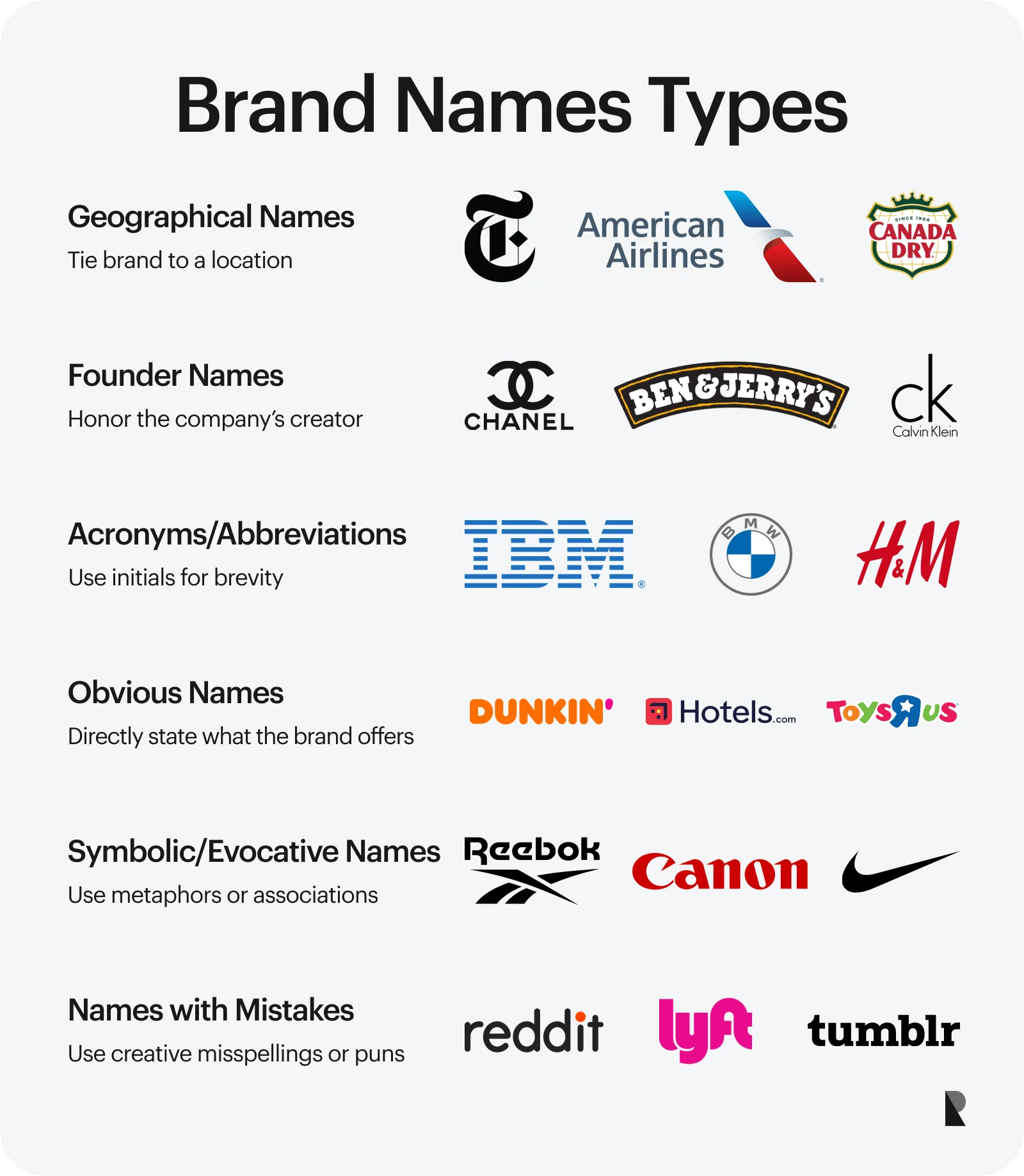
Business names come in all shapes and sizes. According to Nielsen Media Research, over 500,000 brands worldwide serve multinational markets.
Breaking them into strict categories is almost impossible because no rules or standards exist. In addition, there are always names that fall into two or more categories. However, professional brand agencies allocate several standard types.
Geographical Names
I bet you have heard about the New York Times, American Airlines, and Canada Dry – these are representative examples of geographical business naming.
A geographical brand name links the company's identity to a specific location. It can be a city, a country, or even one of the beloved tourist landmarks. This approach allows the organization to get all the benefits hidden in cultural, natural, and historical associations of the namesake and instantly enjoy a specific connection to particular meanings or ideas.
However, there is a downside. Business names related to specific locations are trickier to promote because customers assume product or service are location-centric. On top of that, it becomes hard to market when the company outgrows the region.
Names in Honor of the Founders
Like geographical, brand names created in honor of the founders are considered old-time classics with similar advantages. For instance, they also enjoy the benefits of the associations of the namesake. On top of that, if the founder has a strong reputation, the company will also inherit it.
Take any fashion company: Chanel, Louis Vuitton, Prada. They have gained popularity and high revenue from people who established themselves as respected fashion designers. Even today, when they are no longer alive, their companies thrive, exploiting heritage to the full extent.
The main caveat of such business names is that they are difficult to market at the outset. They require more investment and time to build awareness and create a reputation and heritage.
Other good examples of founder names are Ben & Jerry's, Calvin Klein, and Colgate.
Abbreviations and Acronyms
Acronyms are tried-and-true solutions for cutting down complex brand names and preserving their heritage or meaning. They can instill a sense of reliability and stability and enjoy the associations and references coming with concepts.
Abbreviations are incredibly popular in tech and automotive industries: BMW, IBM, BP, and HP. However, some exceptions exist; M&Ms, MTV, and H&M are good examples.
The positive side of this type is that the landscape is limitless. Plus, it makes sure people remember and recall it easily. However, it requires huge investments and years of branding and marketing to connect them with their corresponding meaning, evoke emotions, and imbue acronyms with trust and credibility.
Obvious Names
On the other end, acronym names are prominent business names. You can describe them as "what you see is what you get." There is no guessing game whatsoever. This quality is their superpower since they eliminate all confusion and misunderstanding and immediately communicate core competency, providing customers with value.
The best part is that they are transparent, which leads to trust and reliability. On top of that, social media handles them efficiently, offering a wealth of opportunities.
The downside of the approach is that these company names are simplistic. They can be dull and ordinary. Therefore, they require considerable work from the branding agency to help the company reveal its unique personality and charisma.
Some of the most famous representatives in this category are Dunkin Donuts, Toys R Us, Hotels.com, and Pizza Hut.
Symbolism in the Name
Also known as evocative brand names, this category is rich in huge companies like Nike, Canon, Samsung, and Reebok.
The approach uses metaphor or association with certain words, phrases, concepts, animals, and even historical or mythical figures to embed symbolism into the company and align to core values, competency, personality, mission, and brand positioning without much effort. Naming a business honoring a goddess will instantly find its place in people's hearts.
There are several advantages of this category:
- Companies avoid being too obvious.
- They are meaningful and descriptive.
- They are easy to remember.
- They can tell a powerful brand story.
However, it also comes with shortcomings. The category needs more options. It also requires business owners to understand the message well and generate the right feelings and vibes.
Names with Mistakes
Business names with mistakes surface many opportunities to create a unique, meaningful, and symbolic one. Numerous techniques exist to achieve the result: alliteration, onomatopoeia, typos, misspellings, rhyming, puns, phrases, and compound words. The sky is the limit.
Such solutions inherit meaning, concepts, feelings, and vibes from their correct versions. The best part is that finding clever words yet to be branded is much easier.
However, there are several caveats. First, it is crucial to ensure clarity to avoid confusion and misunderstanding. Second, it only works well for serious companies, especially in the B2B sector.
Some examples of mistakes are Tumblr, Reddit, Dribbble, and Lyft.
A Guide to Brand Naming
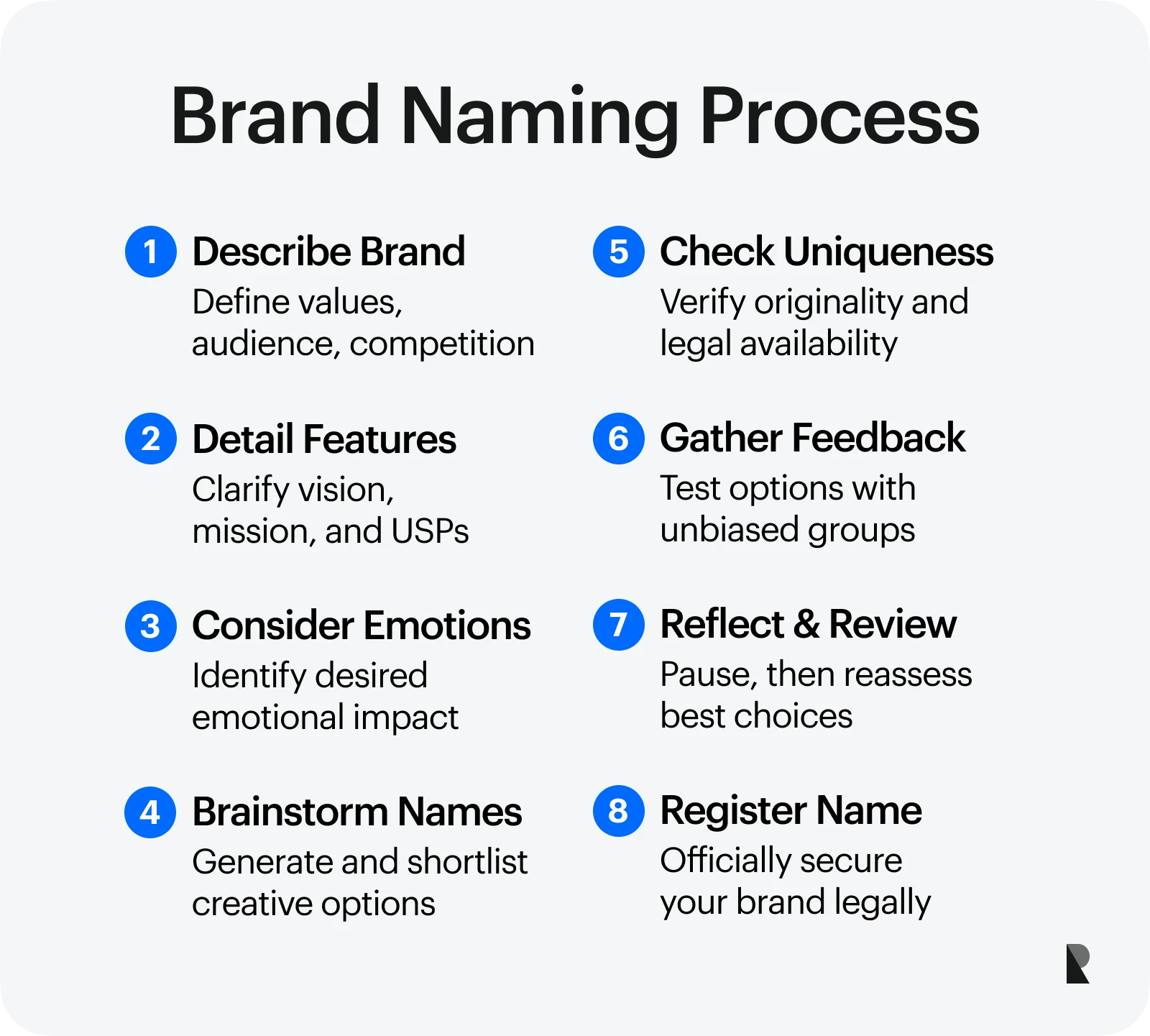
The brand naming process is tricky. There is no one-size-fits-all solution. However, companies may take some basic steps to develop a variant representing their identity, value proposition, and personality while resonating with the audience and standing out.
Step 1 - Describe Your Brand
Before brainstorming ideas, it is crucial to understand who you are and what is your audience, niche, and main competition. Therefore, getting the fundamentals right is the first step to take.
Start with defining the values shared by your business, specifying the archetype, and identifying the target audience and its needs and expectations. Then, analyze the market and competitive landscape. Finally, list brand characteristics such as personality, values, mission, position, and charisma.
Determining what emotions your company and product generate is crucial. How it interacts with customers and what language is used is vital.
Step 2 – Uncover the Brand's Features
Detailing your unique vision, mission, value, product, and role in the community is crucial for understanding what type of business name fits you most. Considering your short- and long-term goals is also vital since they provide insights into how your company name will participate in marketing and advertising campaigns.
Dive deeper into your brand's core values and responsibilities. List unique selling points. Turn your company into a person with characteristic traits. What name does describe it the best?
Step 3 – Consider Emotions
The best brand names are emotive. Emotions play an enormous role in establishing a deep connection with the target audience. Defining the feelings you want to generate helps you choose the right category.
Depending on the type, you either create this emotion through associations over time or enjoy it immediately since it has already been baked into the term.
For example, BMW could elicit trust by spending years on branding, whereas QuickBooks benefits from positive connotations and conveys ease of use immediately.
Step 4 - Brainstorm Ideas
With all fundamentals at your hand, the time has come to let your creative juices flow. Refer to the brief created on the previous stages and branding research for inspiration.
Jot down everything that comes to mind. Take your time – do not rush. It is also highly recommended to invite your team members, friends, agencies, and professional consultants to take part in the process.
When you have compiled a list of a dozen options, choosing a shortlist of possible names is time. Review ideas through a critical lens.
Ask yourself whether the option ties back to your brief, whether it generates necessary emotions, and whether it represents your company as you want. It should have the above characteristics and meet branding objectives and legal requirements.
Step 5 - Make Sure Brand Name Is Unique
The rule of thumb is if somebody hears your name, they should associate it only with your company and products.
Uniqueness is vital for recognition, brand awareness, growth, and success. Therefore, ensure its originality and availability.
Start with the United States Patent and Trademark Office – run the name through their database to see whether it is registered. Then, check Google a
Step 6 - Get Feedback from Disinterested People
Getting external feedback is one of the final steps when deciding on the brand name. Consider it an A/B testing routine that helps determine how your option performs.
Ask disinterested people, create a focus group, or conduct interviews. Confirm expectations as to the remembrance and meaningfulness of the naming. Ask yourself, do your potential consumers understand it the way you intend?
Step 7 – Think Again
Leave this task for several days. This pause lets you see the chosen brand name from a fresh perspective, giving you a foundation to reflect on the option before finalizing it.
Estimate whether it still resonates with the audience and represents your company's identity brief.
Step 8 - Officially Register
The final step of naming is official registration. It is crucial for many good reasons. First of all, you protect your intellectual property from misuse. Second, you protect it from theft. Third, you make it more trustworthy and reliable for customers and investors. Finally, you enhance the company's position and recognition in the marketplace.
The good news is that this process is pretty straightforward: prepare an application, submit it, and wait for approval.
Tips to Avoid Making a Mistake
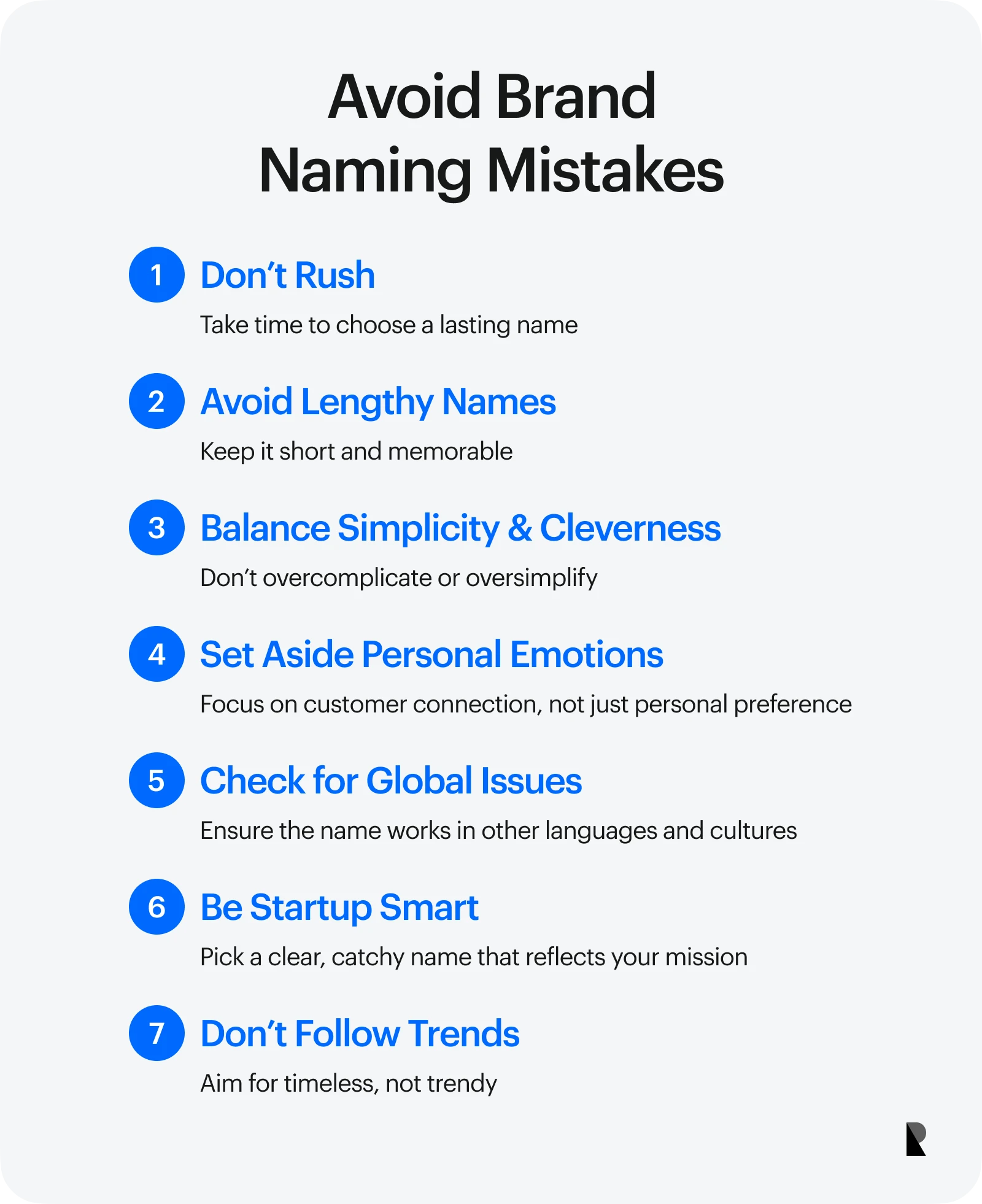
Naming a company is more complex than most people realize. Business owners regularly rush things, seeking ways to release their products quickly. However, this is the first and the biggest mistake they make.
Brand naming needs time. It would help if you chose a name to meet your identity and grow with you, supporting every step you take. It needs undivided attention, time, and commitment.
Consider some other common mistakes companies are bound to make during this process:
Choosing lengthy names
Although the mind can retain long chains of letters, relying on this ability in an oversaturated market is highly inadvisable.
Be oversimplified or too clever
Both these situations may irritate and push away prospects.
Take into account your emotions
It is vital to remember that the company exists to communicate with customers and present its unique personality and value, not yours.
Ignore differences in translation and global discrepancies
Identifying potential double meaning is vital in today's social media-obsessed marketplace because even local brands can quickly become global.
Bad name decisions for startups
For startups, a brand name is more than just a label; it's their first impression. A poor one can hinder growth or create confusion. It's vital for startups to ensure their name reflects their mission and resonates with their target audience.
Unlike bigger companies, startups can't rely on an existing reputation to make up for a weak name. And changing it later can be costly and confusing. So, from the outset, choose one that's catchy, clear, and representative of your business's essence.
Follow trends
Trends come and go. If you want to establish a long-term brand that will live years, decades, and even centuries, then you need a name that will eventually become a classic or synonymous with the niche.
AI Brand Name Generators – Yes or No?
Business name generators have become increasingly popular, especially with the rise of neural networks and AI-powered tools. Truthfully, these instruments can help overcome blocks and provide a sheer dose of inspiration.
They give a solid foundation to build your name by developing various options. However, mindlessly relying on such tools is a huge mistake.
Naming generators do not understand that language is situational: words may take different meanings in different contexts, environments, and times. They need to possess more social intelligence and cultural awareness.
They do not use thorough analysis of the target audience and competition. They also need more creativity and a human approach. Therefore, they may provide ideas rather than a takeaway solution.
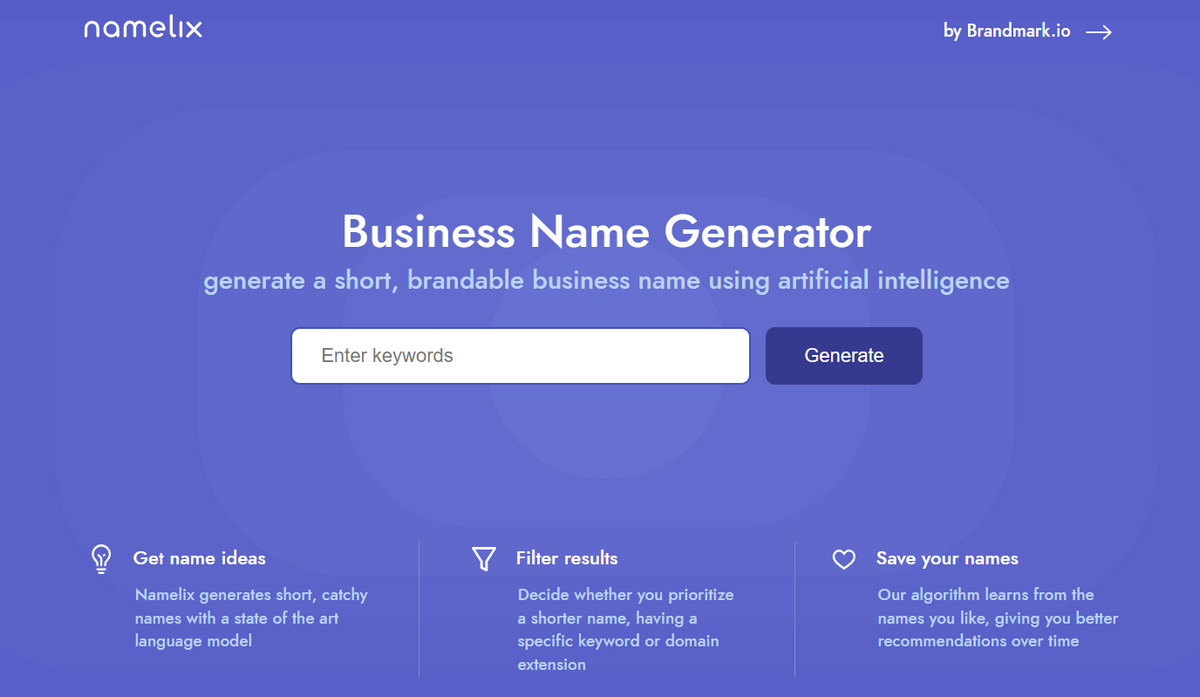
Namelix – Business naming generator
Conclusion
Lack of good naming could be the number one issue standing in the way of your success. Please do not make it an afterthought. It has a vast importance: it differentiates the company, uncovers its competency, reveals its personality, highlights its value, and underlies a solid foundation for marketing and advertising efforts. It might take time to get strong. However, it certainly pays off.
Creating a brand name that is relatable, unique, enduring, timeless, and meaningful is a complicated task. However, it is possible. Start with understating the common types of names.
Then, follow the steps in our guide to develop a perfectly acceptable version. Finally, polish the option by eliminating common mistakes and getting professional advice from a branding agency.
Sep 13, 2023
